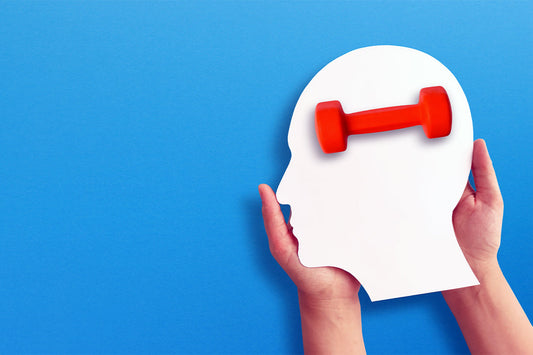When it comes to our overall well-being, we often hear terms like "mental fitness" and "mental health." While these terms are closely related, they represent distinct concepts that play crucial roles in how we feel and function daily. Understanding the difference between mental fitness and mental health is important for anyone seeking to upgrade their quality of life and manage stress, anxiety, or other discomforts.
In this post, we’ll explore both concepts in detail and show how they impact our mind and body. By the end, you’ll have a clearer picture of how these elements work together and what you can do to take care of your mental fitness while managing your mental health.
What is Mental Health?
Mental health refers to your emotional, psychological, and social well-being. It influences how we think, feel, and act, especially in the face of life's challenges. Mental health is about how well we handle stress, relate to others, and make choices. It is an essential part of our overall health and can affect every area of our life, including how we work, interact with family and friends, and deal with daily life stressors.
Several factors contribute to mental health, including genetics, life experiences, and family history. Sometimes, stress or difficult events can lead to symptoms of anxiety or depression, which may require professional care to address.
Common symptoms of stress and anxiety include:
- Irritability or mood swings
- Difficulty concentrating
- Physical tension or headaches
- Feeling overwhelmed or exhausted
If mental health concerns go unaddressed, they can begin to interfere with daily activities, relationships, and even physical health. Emotional health, a component of mental health, refers specifically to how we manage our emotions and navigate life's ups and downs.
What is Mental Fitness?
Mental fitness is the ability to think clearly, solve problems effectively, and maintain focus in the face of challenges. It’s about cultivating and maintaining cognitive functioning, resilience, and the emotional balance needed to navigate daily life. Like physical fitness, mental fitness requires regular attention and care.
Components of mental fitness include:
- Problem-solving: The ability to identify solutions during challenging situations.
- Cognitive functioning: Maintaining sharp thinking, memory, and focus.
- Stress management: Managing how stress affects our mood and behavior.
- Emotional regulation: The ability to control and express emotions in healthy ways.
Much like physical fitness, mental fitness is built and maintained through regular practice. It involves activities that challenge your brain, promote focus, and help build mental resilience. This can include exercises like mindfulness, journaling, or engaging in activities that make you think critically.
Mental Health vs Mental Fitness: Key Differences
While both mental fitness and mental health relate to our well-being, they focus on different aspects of our mind and body:
- Focus:
- Mental health focuses on your emotional and psychological state. It involves your overall well-being and your ability to cope with stress and emotional challenges.
- Mental fitness focuses on maintaining mental clarity, problem-solving skills, and the ability to manage stress effectively.
- Impact on Daily Life:
- Mental health can affect how you feel and behave in various situations. If mental health is compromised, it may lead to anxiety, depression, or other emotional discomforts that affect your daily activities.
- Mental fitness, on the other hand, impacts how effectively you respond to challenges. It helps you think critically and manage your emotional responses, which directly influences your quality of life.
- Maintenance:
- Mental health often requires support, therapy, or counseling, especially when dealing with significant stress, anxiety, or depression.
- Mental fitness is more about building resilience and mental endurance through practices like regular physical activity, mindfulness, or problem-solving exercises.
How Stress, Anxiety, and Mental Fitness Connect
Stress, anxiety, and mental health are closely related. Stress and anxiety are natural responses to challenging situations, but chronic stress can take a toll on both your mental health and mental fitness. Prolonged stress can lead to symptoms of anxiety, which may affect your mental health and decrease your ability to stay mentally fit.
On the other hand, maintaining mental fitness can help manage stress better by helping healthy cognitive functioning and emotional regulation. Regular physical activity, for instance, not only helps enhance your physical health but also plays a key role in mental fitness by supporting brain health and easing feelings of anxiety and stress. Staying physically fit has a direct connection to supporting mental clarity and resilience.
Building Mental Fitness for a Better Quality of Life
Building mental fitness doesn't happen overnight—it requires a consistent effort. Here are some ways you can work on supporting your mental fitness and take care of your mental health at the same time:
- Exercise Regularly: Engaging in physical activity releases endorphins, which supports mood and cognitive functioning. Exercise also helps ease anxiety, which supports both mental fitness and mental health.
- Practice Mindfulness: Mindfulness activities like meditation, deep breathing, and yoga can help ease stress and support emotional health by promoting relaxation and focus.
- Challenge Your Brain: Engage in activities that stimulate your thinking, like puzzles, reading, or learning new skills. These help maintain mental clarity and strengthen cognitive functioning.
- Get Enough Sleep: Quality sleep is vital for mental health and mental fitness. Lack of sleep can worsen stress and impair cognitive function, making it harder to manage daily challenges.
- Develop a Support System: Building and nurturing relationships with friends and family can provide emotional support, which is essential for both mental fitness and mental health.
Conclusion
In summary, mental health and mental fitness are interconnected but distinct concepts. Mental health is about managing your emotional well-being and coping with stress, anxiety, or other emotional challenges. Mental fitness is about maintaining clarity of thought, resilience, and problem-solving skills in your everyday life.
Taking care of both your mental health and mental fitness is essential for leading a balanced, fulfilling life. Regular physical activity, stress management techniques, and cognitive exercises can help you strengthen both aspects. By working on your mental fitness and managing your mental health, you can support your overall quality of life, feel more in control, and better equipped to handle whatever challenges come your way.






